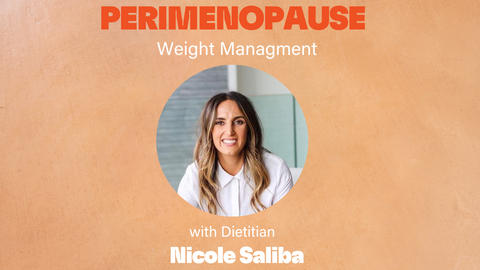Weight gain and changes in body shape are not only unwanted side-effects of perimenopause but also extremely common. Perimenopause is the period before menopause where a woman’s oestrogen levels are declining and lasts between 4-8yrs. The average age of starting perimenopause in Australia is 48yrs. In this weeks blog our resident women’s health dietitian Nicole gives her top tips for combatting weight gain during perimenopause.
How common is weight gain during perimenopause?
On average, women gain between 1 to 2 kilos a year between the ages of 45 to 55. One study found that during perimenopause women lost lean muscle mass and almost doubled their body fat levels. More often than not during this transition women gain weight around their bellies and organs which is the worst place to store it as it is associated with inflammation and conditions such as insulin resistance, type two diabetes, heart disease, depression and some types of cancers such as breast cancer. Carrying excess body fat can also worsen symptoms such as hot flushes and night sweats and negatively impact your quality of life
What causes weight gain during perimenopause?
There are a few things going on which make weight gain common including
- Low levels of oestrogen which cause loss of muscle. When you lose muscle your metabolism slows down. Low oestrogen also encourages fat storage around your belly.
- Sleep disturbances are common during this times and affect your hunger hormones as well as your energy and motivation to eat well and exercise.
- Insulin resistance is common during this time and causes weight gain .
What can you do to lose weight or maintain a healthy weight?
- Lift weights and do resistance exercises at least 2-3x/wk to help with maintaining muscle mass and keeping your metabolism firing
- Don’t go on a fad diet as they have a less than 5% success rate and are more likely to make you gain weight (plus more) in the future
- Eat in a calorie deficit if you are trying to lose weight. Aim for a 500-700cal calorie deficit but be sure to see a health professional to help you figure out what this is for you
- Get a good hit of protein in your diet. This helps to keep you full and also supports muscle growth. Aim for at least 1.5 grams of protein per kilo of your goal/ideal weight which is roughly 90g of protein for a 60kg woman. All of the Activate Foods meals pack an epic hit of protein
- Start the day with a protein rich breakfast. The activate foods breakfast frittata is a winner
- Don’t consume the bulk of your calories at night and sometimes opting for a lower carb meal can help. Activate Foods has a dedicated range of low carb meals and most are low GI
- Eat a plant-rich diet that includes low GI wholegrains, fruit, vegetables, nuts, seeds, herbs, extra-virgin olive oil and legumes. This way of eating is associated with being a healthier weight, lower rates of heart disease and diabetes (menopause increases a woman's future risk of developing these), depression and Alzheimers. All of the Activate Foods meals are rich in a variety of plant-foods. Include 2-3 of their vegetarian meals per week.
Reach out to one of our dietitians at Eatsense to help you navigate this time in your life.
Eatsense
https://eatsense.com.au/


